
The last batch
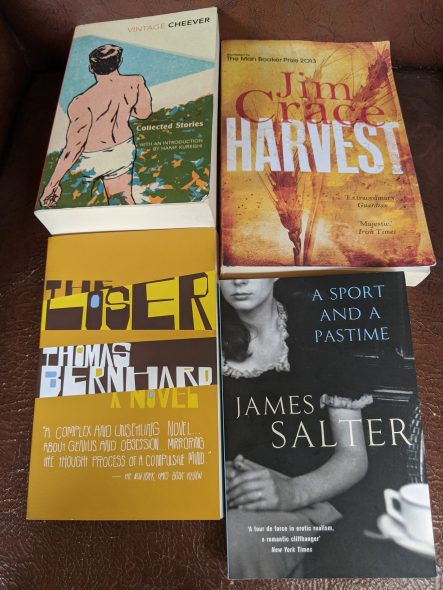
Is there a more magnificent collection of short stories than this 900 page monster Collected Stories by John Cheever? Before beginning, in my mind I’d confused Cheever for Raymond Carver, who I had mixed feelings about – his unsentimental, brusk (but highly acclaimed) shorts I’d read a decade ago and left me a bit cold. Once I realised Cheever was a different beast, I let these period pieces of the 50s and 60s wash over me. The word luminous (from the review on the back) comes to mind when thinking about these 60 short stories – so many of them unpredictable and odd little urban stories of the affluent suburban neighbourhoods of his upbringing. Kim looked him up and told me about a famous one of his “The Swimmer” before I’d read it, and partly spoiled it, but there were so many here that I loved, it was hard to pick a dud. Occasionally uncomfortable, like the male stalker in The Chaste Clarissa, an office dalliance gone wrong in The Five Forty Eight, and the mortified parents in Clancy in the Tower of Babel, there was also plenty of playful commentary on suburban ambition, and a wonderful lack of predictability all round. Probably my best read in years – I could do it all again now. 5 stars.
I haven’t read any other books by Jim Crace, but this one, Harvest is a lot like those of Geraldine Brooks thematically. I’m a bit confused about the exact era, but it seemed to be around the time (16th or 17th century) when enclosure was increasingly occurring, and more efficient agricultural practices were being enforced upon traditional farm workers in small villages across the UK. I thought it was a pretty successful novel, easy to read, and also staggeringly cruel in parts. 4 stars.
The podcast BackListed recommended Old Masters by Thomas Bernhard, but all I could seem to find was The Loser, which in hindsight was probably a better choice for me. From what I can tell, they are similar books, except the former is rantings about the petty smallness and inwardness of Austria seen through the eyes of some ageing art critics, and The Loser was also angry, but less easy to define, being more focused on the lives and achievements of Glenn Gould, Wertheimer and the unknown narrator, all virtuoso pianists. To say this is a swirling, circular monologue of a novel is an understatement, and any quick lookup / podcast tells that the author was known for being a difficult, death-obsessed and uncompromising. I don’t think I’ll read another one of his, but I still found it interesting if irrational and misanthropic. 4 stars.
I can’t resist the odd bit of eroticism and there’s no doubt that James Salter did it well in A Sport and a Pastime, however I found myself reading it in tiny sections, distracted by my phone, or by chess puzzles or Twitter. Just a total mismatch for my mood at the time, despite the writing being really good. To explain, after about 1/3 of the way in, the book mostly cycled between daily wake up morning sex, driving to the next French village, baths together, and then finding a nice place to have dinner. Worst of all, in the end, the handsome American just leaves and flies home, however somehow all parties are sated. 3.5 stars.
What did I do in 2019?
Well, I’ll start off with what I didn’t do – run. By May or June my foot soreness had reached the point that I couldn’t go on, and I ended up getting some scans and eventually a cortisone injection into my left heel in August. Managed a couple of runs after that before things returned to their sorry state. I wish I could say that I suddenly found solace in swimming or riding but those things never really happened either. Hello 73kg again.
I did have a great reading year though, and inspired by Kim and Jenny joining a book club, I went to a Meetup book club in North Fitzroy in December and gave away a copy of my favourite book this year (Beauty is a Wound). We didn’t watch as much TV together this year, but Silicon Valley, The Man in the High Castle, The Crown and Game of Thrones come to mind.
This year I got more involved in my fantasy baseball league (UDL), became more confident in my player trading, did some Skype interviews and got nominated as the secretary for 2020. I started collecting player cards for an album that reflected my team at the end of each season. That was really fun.
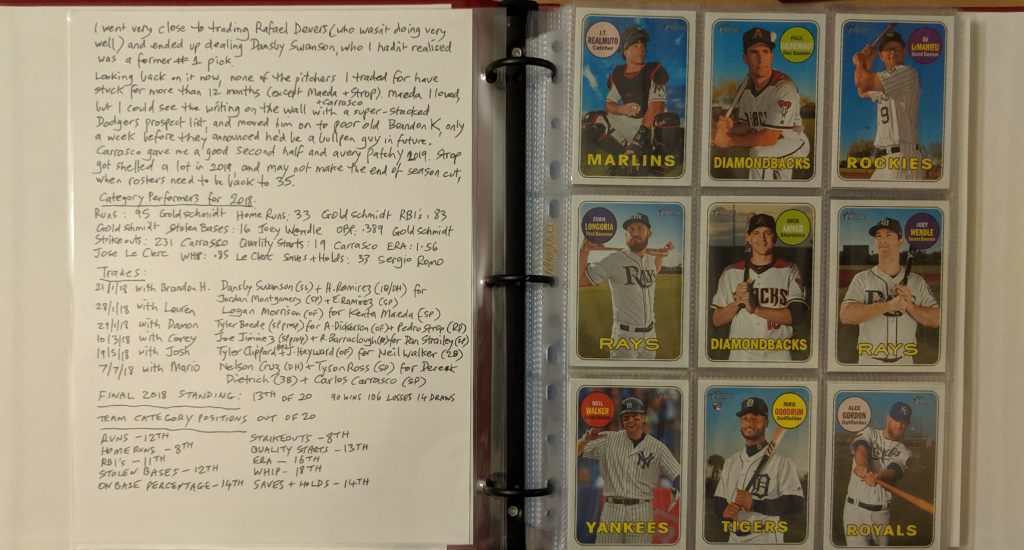
In Feb I started some piano lessons again at Red Note Studios in Gilbert Road, and wound up doing my grade 1 AMEB exam on a very nervous weekday morning in December. I didn’t think I played my set pieces very well, but the instructor mostly disagreed and I wound up with a great result. My hands were shaking at lunch at Miss Margaret 10 minutes afterwards. I’ll take a bit of time off for a few months before committing to another year – the lessons are pretty pricey and I’m coming up with what seems like some physical limitations, which is worrying.
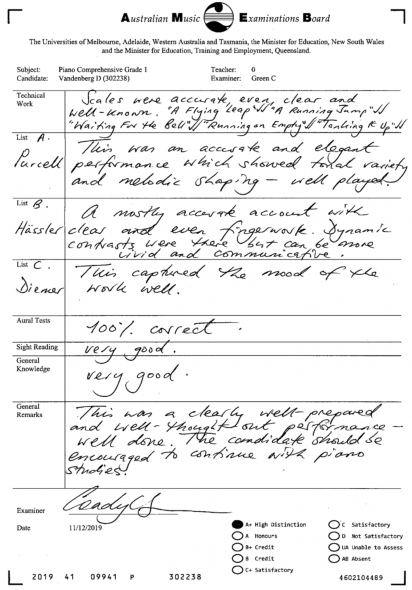
The jigsaw and podcasts (my god there was a lot of baseball this year – see below) thing is still going strong, and Kim just loves buying me loads of them, which is lovely but at the same time isn’t going to get any home renovations started. I’ve also started drinking more again, which summer isn’t helping but is becoming more steady and regular than it should be. 2019 favourites were Stomping Ground IPA, Hawkers IPA and pretty much anything from Two Birds out of Footscray.
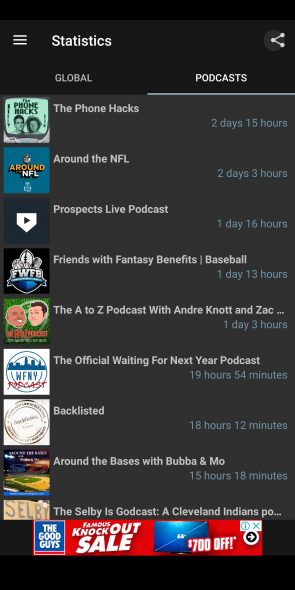
I did quite a bit of travel in 2019 for work to NZ – Bluff, Mount Maunganui, Seaview, Woolston (Christchurch) and Lyttelton and I really enjoyed it. Can I please retire to the South Island oneday?
What else happened? Kim got an electric bike for Christmas and I got a PS4. The people who live behind us on Oakover Road sold their house for a lot. We had a few rats in the compost this year, and gave up on most things except herbs in the backyard (but still tons of pots to water). They redid the whole school oval across the road with irrigation and new turf and it’s wonderful. After the NZ cruise, Kim went into hospital in March for a few weeks for anxiety and was off work for a few months, but she’s mostly fine now. She started playing WoW and D&D with Michael and Sian, Ben and Oui too.
Lastly I started playing some Chess puzzles on my phone, something I haven’t done in 35 years, and no surprises I am not very good at it. Richmond won the Grand Final and Kim is now back on the bandwagon! I must be reverting back to my teens because I’m now finding myself listening to Ipswich Town podcasts and watching game highlight -so weird.
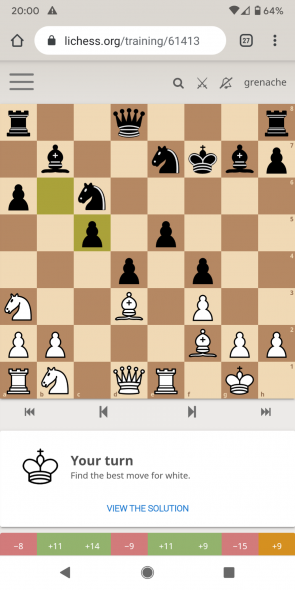
It’s been a solid year really, but apart from my foot, since about July I’ve been having bad allergy symptoms, which disappeared up in Woolgoolga but then reappeared two weeks after getting back – I’ve been on daily or twice daily Telfast for 4-5 months now. WTF!
Book time again..
My biggish reading year continues. I was about to say I enjoyed this batch less than usual, but when sifting through them again before review, found only 2 that I’d given less than 4 stars. Have a guess which ones!
Calvino’s Marcovaldo wasn’t quite the same book or masterpiece that the podcast Backlisted suggested Italian Stories was when they referenced it recently. Goodreads gives it a 3.8 compared to Italian Stories (4.18). I assumed Marcovaldo would be a subset bearing the best bits of the latter but now I doubt it. It was entertaining in a “well-intentioned, but odd yokel subjects his family to another whimsically conjured obsession, which usually ends up badly” kind of way but didn’t make me laugh or stick in my mind like I’d hoped. 3 stars for me.
I think Pat Barker’s Regeneration trilogy technically counts as 3 books, but the first in particular was a such a narrow, scholarly piece that it read more like a sombre doctor’s private journal. I kept waiting on it to open up to a broader story but that never really happened, however I enjoyed the series overall, feeling the intense empathy of the writer, and the well described conflicted emotions of the World War 1 soldiers wanting to return to the fray despite knowing of their almost certain annihilation if that happened, and yet doing it anyway. Book two was more free-wheeling and conventional in tone, and explored interesting stories of gay/pacifist dissent, and some brutally unorthodox treatment methods for traumatised individuals. Book three brought it all together, but I found myself confused in some of the sudden scenes in the Solomon Islands – perhaps it was a flashback to an earlier time that I’d missed, but I didn’t understand the significance of it. Not sure I’d recommend the series to many friends I know, due to the slightly depressing theme and the sense that the author felt morally bound to transcribe case studies in full from hundred year old journals at the expense of the story. Still, a really well researched achievement that feels like 4 stars from me.
Play it as it Lays by Joan Didion was one of the more depressing books I’ve ever read. An attractive, well-connected actress finds the only way out of her hedonistic circle of friends and demanding ex is to take pills and sleep or drive the highways to make her feel something; anything. A devastating critique of the 70s Hollywood scene, the writing was incredible, but the subject was doubly unbearable in contrast to my just-read three books about earnest self sacrificing WW1 soldiers. I need to read another of hers. 4 stars.
Homesick for another World – Ottessa Moshfegh – A collection of very inventive stories in a world where you need to be very quirky or very creepy to stand out from the rest – and this collection really does. Comparing it to other recent reads, this is weirder, creepier and a little less self-conscious than Crudo, and more approachable than Men and Cartoons. A wonderful ride that was always unpredictable. 4.5 stars.
Less by Andrew Sean Greer won the Pulitzer Prize for Fiction in 2018, but reading it was a disjointed experience, as I tried to read it in lots of small snatches in the caravan, fighting reality shows on TV and visits from pensioners wanting their tablets upgraded. I really couldn’t warm to the main character and his utter hopelessness, nor to the romantic theme, or to the writing style. There were sections I loved, but I couldn’t shake the feeling I was being manipulated. 3.5 stars.
I really wasn’t expecting Washington Black by Esi Edugyan to be such a straightforward, bare bones affair for a book that nearly won the 2018 Man Booker Prize. The story of a slave rescued from a likely terrible fate on a Barbados plantation in the 1830s, Wash befriends a series of wealthy eccentrics and becomes scientifically educated whilst avoiding a bounty hunter who chases him to remote locations through a series of eyebrow raising coincidences. I wasn’t in love with the first person style which often felt odd, but I had no trouble remaining interested, even if by half way through the plot felt like a mechanical set of scenes designed to get Wash to an endpoint. I know this is terribly critical of me, for a book that was easy to read and never boring and will almost certainly be made into a movie, but I can only give it 4 stars.
Piano and West Preston
I decided to begin piano lessons again this year when I realised the studio within 5 minutes walking distance of our house had free slots on weeknights. My satisfaction with living in Preston for the past 28 years (and not succumbing to moving houses out of restlessness) seems to rise with every new local person I talk to and every new shop I can walk to. I’m enjoying being less and less car dependant, and so for now it’s the coffee shop, the hairdresser, the lovely couple who run the grog shop and Red Note Piano Studios. I try hard to remember the shopkeepers and people I run into’s names.
I have long been thinking about what ties me to where I live and whether it would continue in the future, even into retirement. I don’t think I have enough friends or activities nearby to make a compelling argument for staying and I find myself trying harder to find some community I suppose, knowing a decision is coming at some point.
In a silly way I’m enjoying ticking off the years in one place and yet I’m wary of falling into my grandparents scenario of “50 years in our house in Preston, but wow we’re loving this new unit in Heidelberg – wish we moved earlier”. And then dying within 5 years or so.
But back to piano. I stopped in 2007 when World of Warcraft kicked in hard and I just couldn’t keep up the motivation. This time (Feb 2019) my teacher is half my age and she’s got similar classical interests Bach etc..and likes Phillip Glass too. She reckons she wrote a thesis on minimalism. We’re still getting to know each other a bit but it’s going well and I hope to do the grade 1 exams in December.
Leesa Cupcake
I rarely use this site for anything but book reviews anymore, but here and there other things need to be noted. And in the past 12 months there have been some high and low points. After Bonnie died so suddenly in mid 2018, I got it into my head in the months to follow that Fergus had lost some zest, perhaps even more than a 15 year old dog with faded hearing and dozens of benign lumps should. He just slept and slept. Kim and I debated it in a pretty casual way, and in building a case for another dog, my mind was tossing up how much effort it was to look after 2 dogs vs. 1, versus how much I wanted another dog around to give him more interest in life. It was inferred that it was on me to take most of the ongoing responsibility if we went down that path, probably because Bonnie had been quite a burden really.
Once again it took a lot longer than I wanted and I probably applied for about 8-10 dogs in varying states but generally older and with some health concerns, but I still rarely got a call back. I like how the rescue people take their caretaker role seriously but it made me anxious when they would talk about a meet and greet session which I knew Fergus would fail. I don’t know why he tries to chomp other dogs really. In the end we drove to Wodonga and in a highway roadhouse carpark met a free spirited young guy called Morgan who would do the rounds of outback NSW pounds and try and rehome them regionally or in Kyneton. Even then, he only let us take her because the previously approved adopters hadn’t got back to them the day before.
Leesa Cupcake was her name and she was really shy and kept wanting to get on Morgan’s lap and lick him on the face as a submissive act. We had the impression she had been part of pack of 3-4 dogs and hadn’t been on her own much. We took her back with us and it was interesting to watch her react to Preston. On the lead she had no idea what to do, and she mostly just followed Fergus with her head snapping at the slightest noises on the street. I don’t think she’d ever been in a city before. In the early months she was fantastic when meeting other dogs but over time this has changed as she’s become more confident and aggressive. She loves nothing more than lunging at birds or getting a head of steam up approaching other dog houses.
I’m so happy she is a healthy 8 year old and isn’t too dominant with Fergus. I think he’s picked up a lot since getting her and I see him watching her and following her as he trusts her eyesight and ears. She gets into bed with him sometimes out of boredom I suspect and he stands up irritated and moves over to her bed and spends ages mussing it up till it’s how he likes it. She’s put on a lot of weight too, thanks to our overly generous treat regime. It makes me excited that we’re about to take her on a caravan holiday to the beach which she’s likely never been to before. I bet she will love chasing the birds there and I’ll take some video for sure.
More…
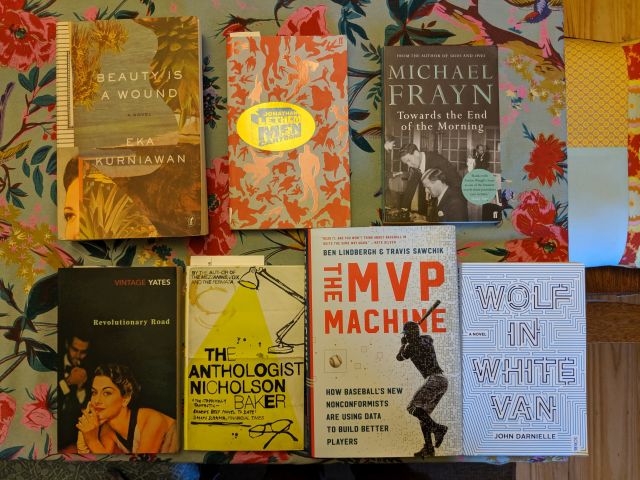
A couple more 5 star books in this batch also.
Beauty is a Wound by Eka Kurniawan. I thought I was largely done with magic realism in the 90s after large doses of Marquez and Allende, but wow, give me more – what a crazy story this was. Easily the most imaginative, fun and readable book out of this lot, but also incredibly dark. It continued to surprise and the magical stuff didn’t really ramp up until the last bit thank goodness. I could have kept reading forever. 5 stars.
Men and Cartoons by Jonathan Lethem. Looking back, to read this after the previous book was not ideal. The stories seem self-conscious and overworked, a couple of them are just terrible really, but there’s quite a bit of imagination on show too. Some of these feel like early attempts at short stories that didn’t quite work or fell short, but I’d still give it 3 stars for originality.
Towards the End of the Morning by Michael Frayn. Written in 1967, this funny little piece seemed to be exactly my kind of thing – an expose into the worst excesses of a newspaper office heading towards irrelevance, but along the way I realised that it was a lot more farcical than I expected. Some of the scenes in the TV studio were excruciating and unlikely, and although you know the protagonist is a silly git, and all the men in it are hopeless, it just made me a little sad in the end. I don’t think I love comedy in a novel much. 3.5 stars.
Revolutionary Road by Richard Yates. This must have been quite a shocking book for its time (1961) when divorce or family issues were scandalous things, not to be talked about. It’s beautifully written – the tension ratchets up relentlessly, and the crushing of dreams is heartbreakingly detailed. A very affecting book and I’m so pleased I finally got to it. 5 stars.
The Anthologist by Nicholson Baker. A series of essays talking about the rhythm of poetry (fairly handy really) linked by a man-loses-partner-frustrated-by-procrastination-and-tries-to win-her-back story. I didn’t love it, and I wouldn’t recommend it. 3 stars.
The MVP Machine by Lindbergh and Sawchik. The only non-fiction in this batch of books, this had been all over my Twitter feed for months until I succumbed. I know there’s still a lot of things I don’t know about baseball, and I’ll confess I did learn a bit about spin rates and how determined Trevor Bauer is, but it was overly long, repetitive and had a cheap, rough dust-jacket which I could barely stand to touch. 3 stars.
Wolf in White Van by John Darnielle (Mountain Goats). There were some early disconcerting moments because the book is put together in reverse order, so it’s funny that he titled it Wolf in White Van, because that’s what’s heard when playing Larry Norman’s “666” song backwards (for the satanic voices). A really interesting premise about a mail order adventure game “Trace Italian” run by a handicapped teenager, which ends up having real world consequences for some of the players. This is the sort of book that makes me nostalgic for the pre-internet age, when our imaginations were free to be explored and which spawned Dungeons and Dragons and the like. Occasionally it was a little verbose, but otherwise it was an amazing and worthwhile journey. 4 stars.
On pace for a record setting book year
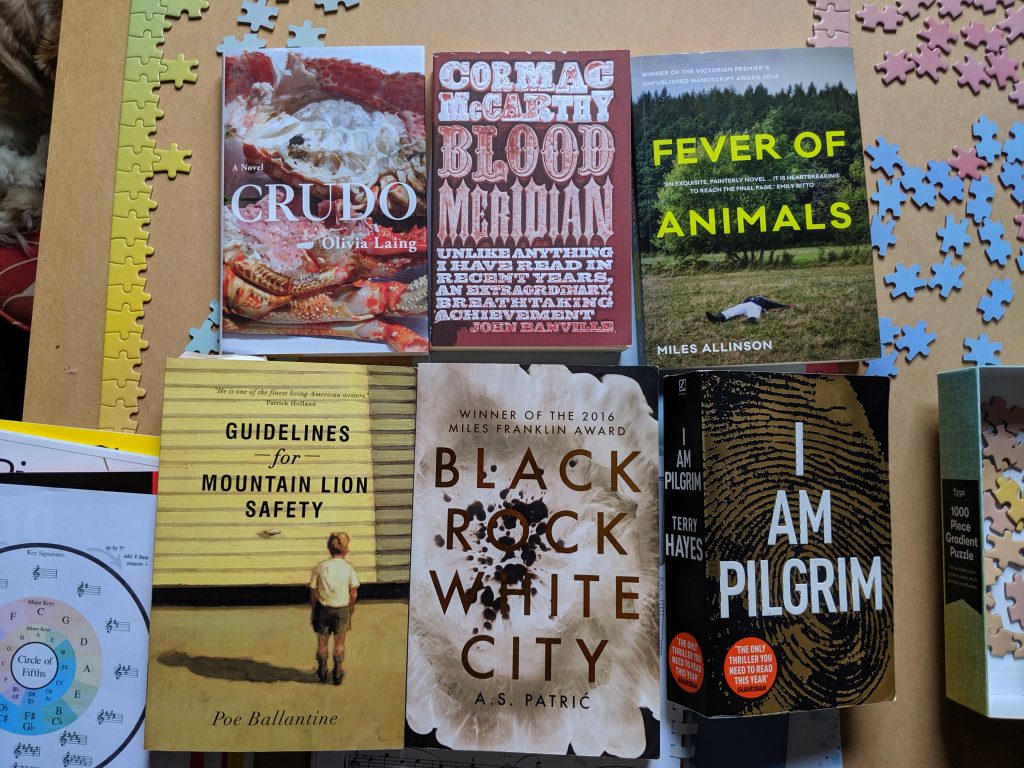
What a wonderful set of books to have to write about – fresh off our cruise, I found books 3,4 and 5 for 3 bucks in an Op Shop and devoured them all, before finishing off with my yearly crime/thriller pulp for a bit of 900 page fun.
Bought in New Zealand on our cruise, Crudo by Olivier Lang came recommended by someone on Twitter, and is really not my normal thing, but I enjoyed it. Anxious, paranoid, and worried about an uncertain political future, the narrator edges towards a future marriage like it’s a doomsday clock, afraid of everything it will bring. The writing is wonderfully dense with imaginative, seemingly disconnected phrases joined into sentences, always surprising and keeping you unbalanced as a reader. I found it a little self-conscious at times but found myself wanting more at the end. 4 stars.
Blood Meridian by Cormac McCarthy had been sitting on my shelf for years, and I think the cover and font put me off it for a long time, when I really should have been more fearful of the content in hindsight. Telling the historically true story of an 1850’s young teenage runaway that is enlisted in a group of hard men bounty hunting for Indian scalps along the Texas- Mexico border, it was compelling and repetitive at times, but hands down it was the most relentlessly bleak and murderous book I’ve ever read. I would not recommend it to most people, because there sections which did sicken this sensitive modern reader, some of which involved animal cruelty and the murder of many, many innocents. Not since Bolano’s 2666 have I felt such revulsion, and yet Blood Meridian goes way further, to the point of being apocalyptic. All through it, the brooding, relentless, messianic character, the Judge provides tension and finally horror when the Indians are no longer the enemy and the barbarity turns to events within the hunting party itself. Incredibly unsettling and impossible to forget – 4.5 stars.
After all that butchery, I needed something very different to remind myself of the the good things in the world, and I found it in the irresistible front cover and title Fever of Animals by Miles Allinson (a Victorian writer in his mid 30s at the time of writing). This intimate, self-aware book was everything that the last book in this series of reviews was not; unsure, not fully formed or thought out, and yet almost as compelling in its own quirky way. A seemingly autobiographical voyage to eastern Europe to discover the mystery of how the painter of a small work found on the wall of a Melbourne restaurant died after going missing in a forest walk in 1967. It’s the sort of thing that’s easily resolved in movies and Hollywood, but not 50 years later by a blundering amateur who’s unable to speak Romanian. It’s a fun journey regardless and worth the read 3.5 stars.
Poe Ballantine wrote the whimsical Guidelines for Mountain Lion Safety and with a name like that, I was preparing myself for some possible eyerolling until I read the phrase “one of Americas finest living writers” on the blurb. And it was wonderful stuff – here was a man who’d travelled his country on the cheap, had done a million two bit jobs and could write well about it all. I loved these short stories about his upbringing, girlfriends, drug addled uncle, and debaucherous years, and I just gobbled it all up. I’d read him again for sure. 4 stars.
This next book Black Rock White City, was the last of the three Op Shop ones, and I had saved it to this point because it was the one I was least excited about. Mostly because it was Australian, and because I thought I knew all the Aussie authors I liked already. It was a real surprise and I probably ended up enjoying it the most because of the suspense and because (I can’t believe I’m saying this) the relationships and dialogue were really convincing, if not the premise of the story (which reminded me a lot of the John Lanchester book I finished earlier this year). A.S Patric has written a compelling, edgy story of a first generation migrant caught up in events he wants no part of, and struggles to explain. 4 stars.
I was looking off into space at Kim’s “to read” bookshelf and came across a spine with a label “The only thriller you need to read this year – Guardian” and I realised it was time for a 900 page dose of pulp, and boy did I Am Pilgrim by Australian Terry Hayes deliver! Ridiculously readable, I spent a bunch of nights saying – oh just 1 more chapter before cursing and turning the light out after another hour. Once you accept that the protagonist is almost flawless, all knowing and wise (and thankfully not a total arsehole) and prescient due to infinite years of combat duty, medical experience blah blah blah, you roll with it, and try and decide whether you’d prefer it if the bad guy(s) get away with it, because those folks are all amazingly skilled as well, and you just have to admire everyone’s utter competence. When the U.S President gets involved you know it’s all jumped the shark but it remains just as compelling regardless. It satisfies in every way, as all of the ends are neatly tidied up, and there are some pretty original and exquisitely timed James Bond-like manoeuvres which make for a hell of a ride. The biggest page turner I’ve read in years. 4 stars – wild!
Amazing what a cruise without internet can do for your reading..
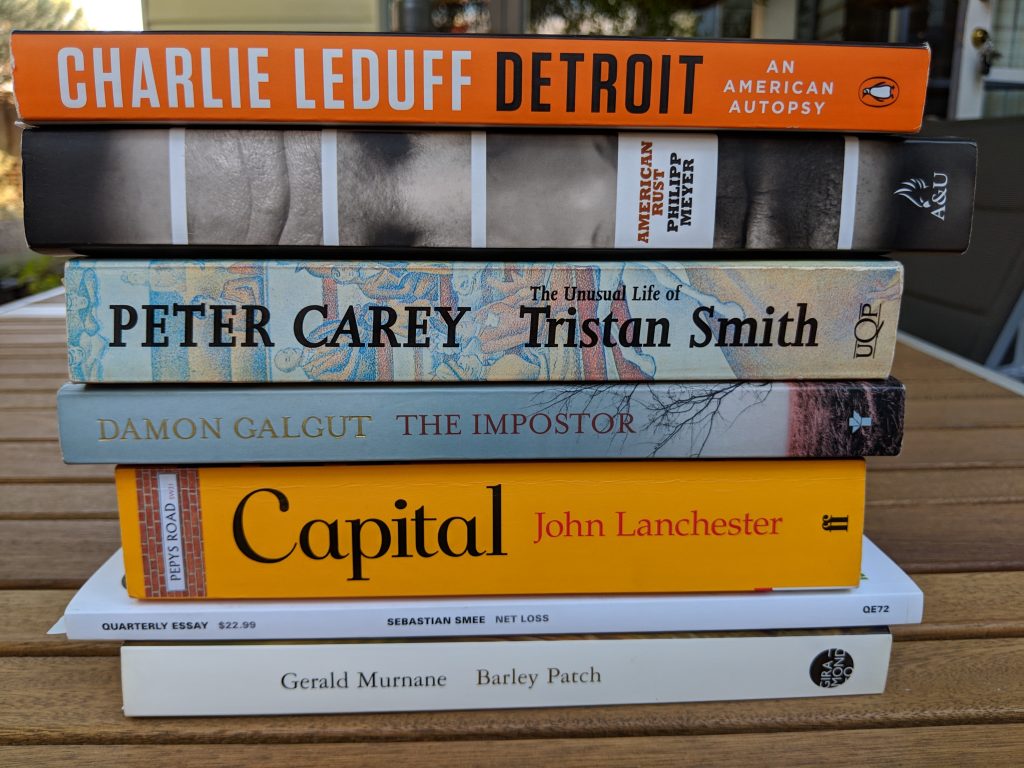
I’ve had a great start to the year with my reading, and nearly all of the books have been wonderful. Inspired by a new podcast called BackListed, I plan to venture off my safe path of Murnane, Galgut and Carey one day, but not just yet. I managed to get through about 3 and a half books in two weeks on our New Zealand cruise, and it was all very effortless.
Murnane’s Barley Patch had been sitting around in my piano / computer room for 10 years and I don’t know why. I have a feeling I bought it after listening to him be interviewed at the Melbourne Book Festival back then, but I’m confused by the Readings sticker, since I think the event was at the MaltHouse Theatre. Regardless, I’m going to be vague here and say that once again, his mesmerising and voyeuristic prose will always captivate me, even if I’m occasionally irritated by his wilful and pedantic use of “boy-man” and “image-object” and digressions about what defines fiction writing, however I’m still planning to go to the Goroke Bowling Club one day and shyly stalk my literary hero in his final days. 4 stars.
As someone who thought in 1994 (and still thinks) that the internet was the greatest thing in the world, I felt I needed to see what cultural richness I’d missed in my life, and Sebastian Smee’s Quarterly Essay Net Loss tried pretty hard to describe it to me. It’s true that with phones around, “it gets hard to pick up a book, harder to stay with it”, but I felt that way playing World of Warcraft too. I was more convinced watching a YouTube video of Roald Dahl writing in his shack than I was after 56 pages of Net Loss. 3 stars.
I’m pretty sure that this is my second John Lanchester book, and both have been straightforward, but intriguing stories. This one, Capital, reads like a BBC drama series (and apparently became one), and beguiles with the premise of a nasty campaign against the (mostly) wealthy home owners of Pepys Road, London by an unknown have not, who leaves “We want what you have” messages everywhere, and which escalates. A little cliche prone at times, but it was fresh and humane and a joy to read. It had me waiting nearly the full 575 pages before spilling the beans. 4 stars.
The Imposter, by Damon Galgut is about an early 40’s man, having lost his 20 year corporate job who finds himself being dared to write the poetry he always dreamed of doing in a rundown rural shack owned by his brother, many hours drive from Johannesburg. Aimless months go by with little progress and the man, finding himself progressively becoming unhinged is grateful when an old now-wealthy school friend takes him on board and offers him weekends away with his wife whilst they transform and old game park into a golf course with plenty of graft and money involving local officials.
This is yet another wonderful book by Galgut whose sense of the racial and wealth divide in South Africa is always concisely detailed and who manages a broody unpredictable storyline in all his novels. 4.5 stars.
I’ve finally spat the dummy with an early Peter Carey book, managing 96 pages of The Unusual Life of Tristan Smith before giving up in disinterest. The forced quirkiness and richness of unlikeable characters felt implausible and inconsistent to me; the construct of the lands of Voorstand and Efica (seemingly a simple name replacement for Australia and New Zealand) added just for novelty. I’m a little afraid to go back and read Illywhacker again in case I feel the same way – I think my tastes have just moved on a bit. I wonder if Carey himself feels a little sheepish about this book in 2019? 2 stars.
American Rust by Philipp Meyer was a much more straightforward, but convincing affair set in a rural Pennsylvania steel town, probably one of thousands of novels published in the last few decades documenting missed opportunities and the jobless consequences for blue collar workers. I found it pretty dark (particularly the prison and the hitchhiking / homeless sections), but it rang true and was a compelling read, jumping between 4 or 5 viewpoints. A self-confident high school jock son finds himself involved in an accidental death of a vagrant and wrestles with his allegiances, whilst a world weary sheriff is forced to make a decision between his relationship with the boys mother or his job. Satisfying and convincing. 4 stars.
Detroit by Charlie LeDuff was not quite the anthology I expected, and in a good way. It’s a memoir of 5 parts ego, 2 parts good Samaritan and 4 parts tabloid gonzo journalist, chasing anything that would sell copies of the Detroit News. LeDuff is no doubt a no-bullshit, ballsy guy who rocked a lot of boats amongst those in power in Detroit by exposing corruption, lack of resourcing and the third world-ness of his hometown. There’s not a lot of hope or positivity in this book, but it’s a hell of an eye-opener and his writing is authentic and utterly frightening. 4 stars.
More reviews of books I barely remember
I need to not wait 6 months before going back over things – there’s a book in this list I had absolutely no memory of reading, and had to re-scan the blurb to remind myself of its merit.
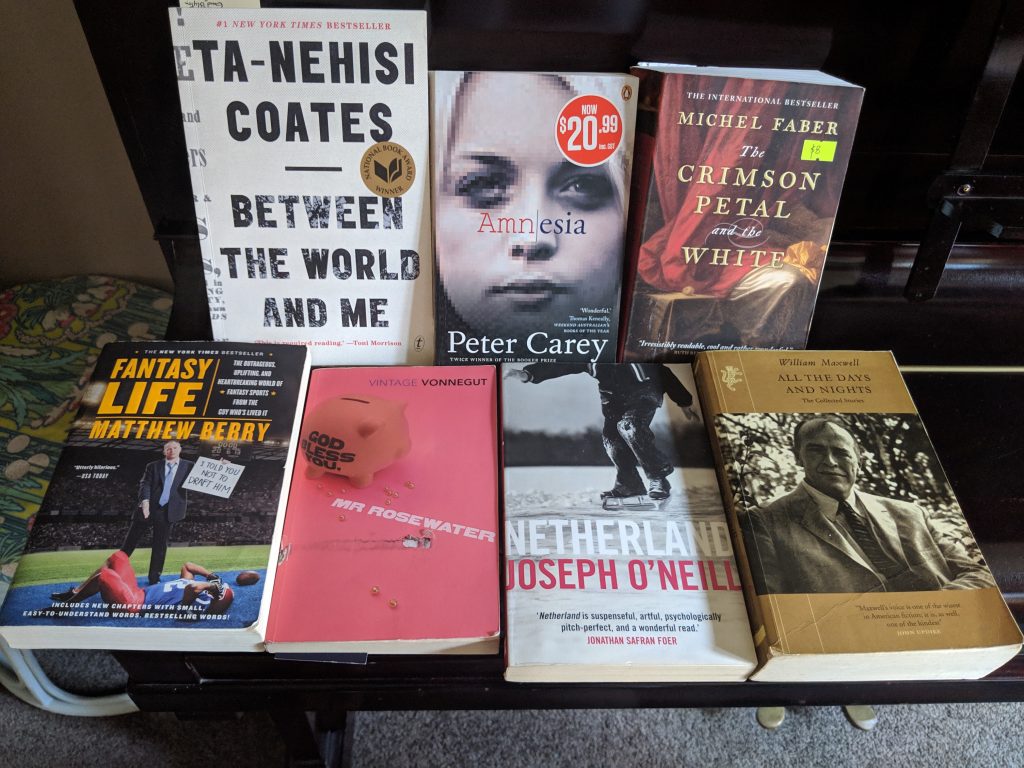
Since I was going to visit the Midwest in September, I remember seeing Between the World and Me, by Coates and thinking – great, a black author and a thin book; perfect if I’m not enjoying it, as I’ll still finish it, and also intriguing because I’ve never consciously read anything about race before. I suspect I didn’t want to slog through Hillbilly Elegy either. I need not have worried about it because it was terrific and eye opening to me, and I read it in about 3 short sessions. 4 stars.
I’ve always liked Peter Carey’s earlier books like Oscar and Lucinda or Illywacker the most because of their quirky characters and unlikely scenarios, but this barely continues to hold true after the Kelly book and now Amnesia, which is set in nearby Coburg and Carlton. Once again (for an expatriot) he shows a remarkable feel for (a perhaps 80’s dated) Melbourne and it’s political factions and migrant families. I wasn’t overly taken by the hacker teens premise of the book, but his characters were very believable and the pages just melted away. An easy read in the presence of a master. 4.5 Stars.
I had absolutely no idea what Michael Faber’s The Crimson Petal and the White was about when I nabbed it secondhand, but the reviews were all great and that’s usually enough for me. I read big chunks of it up in Woolgoolga sitting outside the caravan minding Fergus and it was a pleasure. Apart from the 800 pages – almost twice as long as it needed to be (or could have been), it was an enthralling rags to riches tale of Sugar, a lowly prostitute in the awful, patron-dependent world of 1870’s London. Some really rich character depictions here (the inscrutable Sugar, the ill Agnes Rackham, and the tortured Henry Rackham). A really engaging and forthright story and deserves all its accolades. 5 stars.
In contrast, Matthew Berry’s Fantasy Life was the lazy read I thought I needed afterwards, and by a quarter way through I was regretting it. I should have chucked it then and there but slogged through. 2 stars.
Knowing I was likely going to visit Indianapolis, the early home of Kurt Vonnegut (and the Vonnegut Museum), I decided to read the only book of his I didn’t own – the amusing God Bless you Mr. Rosewater. Having afterwards listened to a nearly 2 hour podcast specifically on this book by two clever guys who call themselves the Vonneguys, I realise how shallow my readings of his books have been. It’s been 10 or 15 years since I’d picked up one of his books, but this one reminded me yet again of the unexpected humour, the originality, and the deep pessimism and cynicism of the man. 4.5 Stars and a fun read.
Cricket is not exactly one of my interests, but there was enough quirk in Joseph O’Neill’s Netherland to capture my interest. A corporatised Dutchman in New York in the midst of an expat marital breakdown finds a local with the passion and insanity to try and introduce the game to the U.S public, with some illegalities thrown in for spice. It was a fun read, however occasionally a little too autobiographical for comfort. Still, a solid book that felt at times like a slow burning thriller without actually delivering as such. 3.5 Stars.
I’ve developed a bit of a love affair with books published by Harvill Press which existed from 1946 to 2005, with their distinctive leopard icon on the spine. I always seem to give them an extra look in secondhand bookshops, perhaps because they seem to publish “serious fiction” which has austere or non-playful covers, as is the case in William Maxwell’s short story collection All the Days and Nights, published in 1994. I had not known Maxwell was a mentor to writers like Updike and Cheever, but on the evidence here, I want to read his longer works too. His writing (to me) is dated by his propensity to not finish stories cleanly or simply, leaving room for interpretation, which is the antithesis of the modern age. I hear him described as a humanist, which I can see, but after Vonnegut, everyone else seems like a milder blander version of that. I still think there is plenty of quality here, and I’ll try him again sometime. 4 stars.

